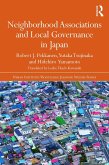Mahi Pal
Rural Local Governance and Development
Theories and Practices of Panchayati Raj Institutions in India
Mahi Pal
Rural Local Governance and Development
Theories and Practices of Panchayati Raj Institutions in India
- Gebundenes Buch
- Merkliste
- Auf die Merkliste
- Bewerten Bewerten
- Teilen
- Produkt teilen
- Produkterinnerung
- Produkterinnerung
This book introduces the concept of governance and aspects of Panchayat Raj Institutions, including the Fifth, Sixth and other Scheduled Areas. It focuses on the role of voluntary and community-based organizations, and the involvement of vulnerable groups in programmes, schemes, strategies and policy instruments in rural development.
Andere Kunden interessierten sich auch für
![Neighborhood Associations and Local Governance in Japan Neighborhood Associations and Local Governance in Japan]() Robert J. PekkanenNeighborhood Associations and Local Governance in Japan178,99 €
Robert J. PekkanenNeighborhood Associations and Local Governance in Japan178,99 €![Local Politics and National Policy Local Politics and National Policy]() Ken Victor Leonard HijinoLocal Politics and National Policy166,99 €
Ken Victor Leonard HijinoLocal Politics and National Policy166,99 €![The Local Government Service The Local Government Service]() J. H. WarrenThe Local Government Service114,99 €
J. H. WarrenThe Local Government Service114,99 €![Local Government Finance Local Government Finance]() Local Government Finance105,99 €
Local Government Finance105,99 €![Local Government Reform in England Local Government Reform in England]() Jack BrandLocal Government Reform in England121,99 €
Jack BrandLocal Government Reform in England121,99 €![Local Government in Britain Since Reorganisation Local Government in Britain Since Reorganisation]() Alan AlexanderLocal Government in Britain Since Reorganisation109,99 €
Alan AlexanderLocal Government in Britain Since Reorganisation109,99 €![Local Politics and National Policy Local Politics and National Policy]() Ken Victor Leonard HijinoLocal Politics and National Policy58,99 €
Ken Victor Leonard HijinoLocal Politics and National Policy58,99 €-
-
-
This book introduces the concept of governance and aspects of Panchayat Raj Institutions, including the Fifth, Sixth and other Scheduled Areas. It focuses on the role of voluntary and community-based organizations, and the involvement of vulnerable groups in programmes, schemes, strategies and policy instruments in rural development.
Produktdetails
- Produktdetails
- Verlag: Routledge
- Seitenzahl: 484
- Erscheinungstermin: 1. Dezember 2025
- Englisch
- Abmessung: 240mm x 161mm x 30mm
- Gewicht: 886g
- ISBN-13: 9781032711607
- ISBN-10: 1032711604
- Artikelnr.: 75012983
- Herstellerkennzeichnung
- Libri GmbH
- Europaallee 1
- 36244 Bad Hersfeld
- gpsr@libri.de
- Verlag: Routledge
- Seitenzahl: 484
- Erscheinungstermin: 1. Dezember 2025
- Englisch
- Abmessung: 240mm x 161mm x 30mm
- Gewicht: 886g
- ISBN-13: 9781032711607
- ISBN-10: 1032711604
- Artikelnr.: 75012983
- Herstellerkennzeichnung
- Libri GmbH
- Europaallee 1
- 36244 Bad Hersfeld
- gpsr@libri.de
Mahi Pal is a former officer of the Indian Economic Service. During his service, he worked in various ministries and institutions in different capacities. He retired from the Ministry of Rural Development (MoRD), where he was engaged in policy and planning matters relating to rural development. Before joining MoRD, he was with the Ministry of Panchayati Raj and studied the state of Panchayats across the states and UTs. He also worked in the then planning commission, Ministries of Social Justice and Empowerment and Statistics and Programme Implementation. In between for five years, he was on deputation as faculty in the Haryana Institute of Rural Development, Nilokheri, Karnal where he was involved in developing reading materials for trainees and imparting training about various issues relating to rural governance, Panchayati Raj and Rural Development to officials and non-officials working in rural areas. He was also engaged in research relating to Panchayats and rural development programmes. There, he observed, very closely, rural society and economy which has subsequently helped him in giving relevant policy inputs in formulating programmes and schemes for rural development in the ministries. He was also a post-doctoral fellowship during 1992-94 at the Institute of Social Sciences, New Delhi, where he specialised in the field of decentralised planning and Panchayati Raj. He was also visiting faculty in the SPA, New Delhi. After retirement Dr. Mahi Pal had worked as Rural Development Expert in the projects on Shyama Prasad Mukherjii Rurban Mission in the SPA, New Delhi. He has also been associated with various civil society organisations and academic bodies. He has also visited several counties. Mahi Pal has published several outstanding research papers in the areas of decentralised governance and rural development in various journals, including Economic and Political Weekly. He has also authored a number of books both in Hindi language and English language. Some of his books have also been published by National Book Trust and Publications Division, Government of India. He has also participated and contributed papers in various national and international conferences/seminars. He has been regularly contributing articles in national dailies and magazines on relevant issues of rural local governance and development.
List of Figures
List of Tables
Preface
Acknowledgements
List of Abbreviations
PART I: Rural Local Governance
1 Understanding Governance, Rural Local Governance and Rural Development
2 Evolution of Panchayati Raj in India
3 Working of Panchayati Raj in India
4 Provisions of the Panchayat (Extension to the Scheduled Areas) Act (PESA)
5 Working of Nyaya Panchayats (Village Level Judicial System) in India
6 People's Participation through Panchayats
7 Civil Society Organisations and Rural Governance
PART II: Rural Development
8 Changing Strategies of Rural Development
9 Major Rural Development Programmes and Their Implementation
10 Convergence and Intersectoral Linkages of Programmes
11 Decentralised Planning
12 Training and Capacity Development
PART III: Way Forward
13 Way Forward for Effective Rural Local Governance
Annex
Index
List of Tables
Preface
Acknowledgements
List of Abbreviations
PART I: Rural Local Governance
1 Understanding Governance, Rural Local Governance and Rural Development
2 Evolution of Panchayati Raj in India
3 Working of Panchayati Raj in India
4 Provisions of the Panchayat (Extension to the Scheduled Areas) Act (PESA)
5 Working of Nyaya Panchayats (Village Level Judicial System) in India
6 People's Participation through Panchayats
7 Civil Society Organisations and Rural Governance
PART II: Rural Development
8 Changing Strategies of Rural Development
9 Major Rural Development Programmes and Their Implementation
10 Convergence and Intersectoral Linkages of Programmes
11 Decentralised Planning
12 Training and Capacity Development
PART III: Way Forward
13 Way Forward for Effective Rural Local Governance
Annex
Index
List of Figures
List of Tables
Preface
Acknowledgements
List of Abbreviations
PART I: Rural Local Governance
1 Understanding Governance, Rural Local Governance and Rural Development
2 Evolution of Panchayati Raj in India
3 Working of Panchayati Raj in India
4 Provisions of the Panchayat (Extension to the Scheduled Areas) Act (PESA)
5 Working of Nyaya Panchayats (Village Level Judicial System) in India
6 People's Participation through Panchayats
7 Civil Society Organisations and Rural Governance
PART II: Rural Development
8 Changing Strategies of Rural Development
9 Major Rural Development Programmes and Their Implementation
10 Convergence and Intersectoral Linkages of Programmes
11 Decentralised Planning
12 Training and Capacity Development
PART III: Way Forward
13 Way Forward for Effective Rural Local Governance
Annex
Index
List of Tables
Preface
Acknowledgements
List of Abbreviations
PART I: Rural Local Governance
1 Understanding Governance, Rural Local Governance and Rural Development
2 Evolution of Panchayati Raj in India
3 Working of Panchayati Raj in India
4 Provisions of the Panchayat (Extension to the Scheduled Areas) Act (PESA)
5 Working of Nyaya Panchayats (Village Level Judicial System) in India
6 People's Participation through Panchayats
7 Civil Society Organisations and Rural Governance
PART II: Rural Development
8 Changing Strategies of Rural Development
9 Major Rural Development Programmes and Their Implementation
10 Convergence and Intersectoral Linkages of Programmes
11 Decentralised Planning
12 Training and Capacity Development
PART III: Way Forward
13 Way Forward for Effective Rural Local Governance
Annex
Index








